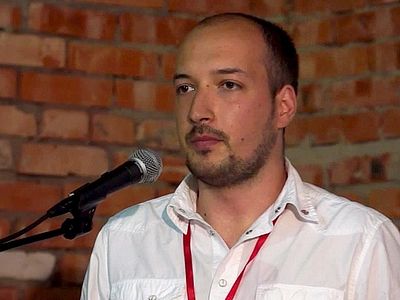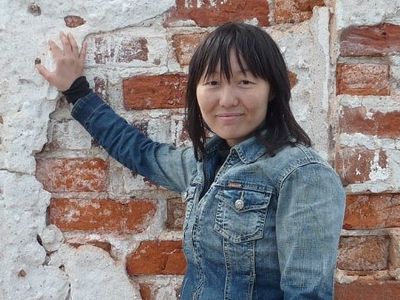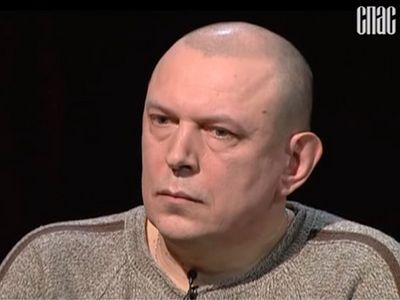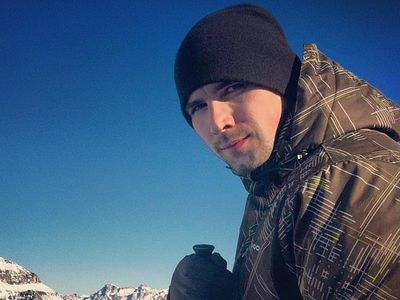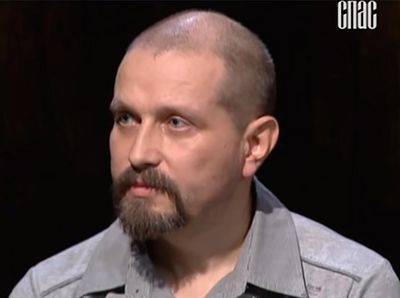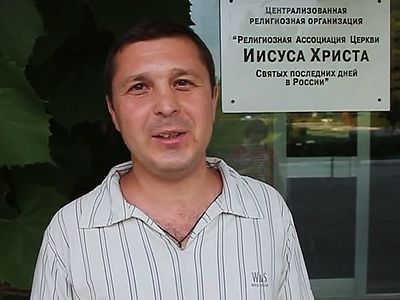We continue to publish the materials of the Spas TV program, My Path To God, where Priest George Maximov interviews people who converted to Orthodoxy from various non-Orthodox denominations. Today’s guest is an Orthodox Kabardian1 who found the Truth in Orthodoxy without losing his national identity (see the video here in Russian).
Father George Maximov: Hello! You’re watching My Path To God. Our guest’s name is Mikhail. He is a descendant from one of the nations that are usually associated with the world of Islam, although every Muslim nation in Russia has a Christian page in its history. Mikhail, please tell us where you’re from and how you began your journey to Christianity?
Mikhail: Hello, Father George. I was born in Nalchik, the Republic of Kabardino-Balkaria. I am Kabardian. I spent the first thirteen years of my life in Nalchik. In 1999, we moved to Moscow. Ever since I was little, I was religious. As were many people in our nation, I was brought up in Islam. I was always interested in matters of religion. In elementary school, I was enrolled in a special class where we were taught the basics of Islam and the Arabic language. When I came to Moscow, it was God’s will that I got admitted to a school in Golyanovo. There was an experimental class where they taught the Law of God. At first I didn’t pay any attention to this subject, but later I became friends with a boy in that class. He was Orthodox and went to church. Many years later he told me, “I didn’t even understand why I decided to come up to you.” He sat next to me and asked, “Do you believe in God?” I replied, “Yes, I do. We believe in Him in a Muslim way.” He said that my views weren’t right and started telling me about Christ and Orthodoxy.
My first reaction was harsh and even aggressive, but the young missionary was undeterred and kept on talking. I was impressed by his courage. Frankly speaking, I believed that Christians were timorous and never thought that any of them would dare to approach me with a sermon. But that boy was incredibly brave. He confidently started proving to me that Christ is the Savior. Seeing his determination, I accepted his offer to take the Law of God classes. It took just a couple of classes to turn me into an Orthodox Christian once and for all. That was how I accepted Orthodoxy when I was 14. I wasn’t baptized for another four years, being a catechumen until I was 18. I attended the Law of God classes and went to Sunday School. I was baptized when I turned 18. This was a big deal for me, and I chose the name of Mikhail in honor of Archangel Michael. Fifteen years have passed since then, and I am still an Orthodox Christian, thank God. I never had any regrets.
Father George: Some of the people that took the same journey told me that at the time of their conversion they were worried and concerned about entering into a strange environment and leaving something close and dear behind. Did you feel something like that during the four years of your preparation for baptism?
Mikhail: Of course, I was concerned and uncomfortable. I thought, I spent my whole life in the Caucasus region and cannot be Orthodox because I am not Russian. At the beginning of my journey, literally in the first month, I thought that since I’m Kabardian I probably won’t be converting to Orthodoxy. I was thinking about that when my friend called and said, “You know, my dear friend, if you started on this path, you have to continue.” And this gave me the strength that I needed.
I did have concerns. My first concern was that people wouldn’t understand or accept me and that they might even hurt me physically. Well, it was that kind of nonsense that first came to mind. The second concern was that if I convert to Orthodoxy, I would become Russian and lose my identity. In fact, this was not the case. When I started going to church and learning about Orthodoxy, I understood that there were no contradictions with the concepts of God and the world that are customary in the southern regions of Russia. When we study the history of the Church, we see how many saints there were from the eastern nations, from Syria and other countries. And when you see Assyrians, Japanese, Chinese, Africans and people of various nationalities in the church, you understand that Orthodoxy is not something national. Conversely, it is something of universal importance. So those concerns and doubts soon disappeared.
Father George: When I studied the history of your nation, I was amazed to see that Kabardian people have a serious, rich and profound legacy of Christianity. I read about your ancestors fighting to be Orthodox and being persecuted by Catholics, when they tried to use the nation’s nobility to cajole the people into Catholicism. Your people specifically fought to be Orthodox2. After that, they continued fighting for a long time to remain Christian, despite very difficult circumstances. There were practically no priests left and Kabardians petitioned the czar in Moscow, asking him to send priests. I was very impressed. How important is all of this for you? Do modern day Kabardians remember that their ancestors used to be Christian?
Mikhail: Yes, when I had just converted to Orthodoxy, it was very interesting for me. It is still important for me that we, Kabardians and Adyghes, were Orthodox. When I started studying this matter, I was surprised to learn that if you look at what happened more than 200 or 300 years ago, you’ll find that all the way up to the 10th century, there was a long period in our history when our nation was Orthodox. Our ancestors were indeed Orthodox and some Kabardian last names prove it. For example, the most common last names in Kabardino-Balkaria are Shogenov and Kardanov. Shogen means “a priest” and kardan means “a deacon” 3.
During three centuries of Islam, people forgot about this history and modern day Kabardians, even though they know that they used to be Orthodox, think about it as a distant past that didn’t last long, about fifty years. Many people have that same mindset. Although, in fact this period lasted considerably longer. I even found proof that an Adyghe bishop participated in one of the Constantinople Councils. For me, of course, it was important and interesting, because at the time of my conversion, I knew practically no contemporary Orthodox Kabardians. Knowing that I was not alone was a breath of fresh air for me. I still felt lonely for some time, but as the years passed, I learned the history. By the way, it should be noted that admiral St. Feodor Ushakov’s ancestors were Circassians. He submitted a petition to the czar where he included his lineage, indicating Circassian prince Ridado as an ancestor. If we look deeper, we will find many former Muslims that converted and later became saints. You can find Circassians among them too.
There are many people in our nation who love our history. If they start looking deep in earnest, they will discover many interesting things.
Father George: There is a stereotype that if somebody from a non-Christian nation converts to Christianity, that person loses his or her national identity, distances from the nation’s culture, forgets the language and national traditions and turns into a Russian, so to say. For example, in the Republic of Tyva I heard that if a Tyvan Buddhist converts to Christianity, his fellow countrymen accuse him of becoming Russian. Is it true in your case? Do you really feel that you lost the national culture and language of Kabardians?
Mikhail: Many people, when they learn that I’m Orthodox, think that I am Russianized because I live in Russia. Indeed, I’ve been living in Moscow for a long time, since I was a child. However, I speak fluent Kabardian and I could have this conversation in Kabardian just as well as in Russian. I can read and write Kabardian and can interpret really well. As far as traditions are concerned, I can honestly say that I know more about our traditions than many other people. It is true, because our father raised us in a traditional way. I know our traditions and don’t feel any estrangement from my nation. For example, when I go to a wedding, a funeral or some other event, I never feel like a fool who doesn’t understand what is going on. On the contrary, I can even suggest to some people the correct way of behaving in accordance with our traditions.
I know many Muslim Kabardians who do not speak Kabardian. They are surprised at how well I speak the language after living in Russia for so many years. And that stereotype you mention is false, it is nonsense. Several times a year I travel to Kabardino-Balkaria and never feel like a lonely Russianized boy there. Nothing of the sort.
It is like saying that after conversion to Orthodoxy you became Greek. We got Orthodoxy from Greeks, right? You didn’t turn into a Greek and I didn’t turn into a Russian. Being Russian and being Orthodox are two different things. Orthodoxy is not a religion of Russians or Greeks, it is a universal religion, a religion of God- chosen people called Orthodox Christians. As Apostle Paul said, There is neither Greek nor Jew… Barbarian, Scythian (Col. 3:11). I’ve been going to church for thirteen years and I’ve never felt estranged or abandoned. I always meet various people in the church, including Dagestanis and Assyrians. They don’t feel estranged from their national identity either. For example, Georgians are Orthodox, too. Look at them, their temper is similar to Kabardians, and they profess Orthodoxy and honor their traditions.
Father George: Indeed, faith brings people together. Well, love rather than faith. When people love the same thing, it is interesting for them to communicate and they quickly find common ground. This is true both for secular things and the love of God, love of truth, and love of Christ. I can personally attest that when I talked to Orthodox Arabs, Kurds, Chinese, Filipinos or Thais, I felt that I was communicating with close people, somebody who is on the same page, because we love one and the same. Sometimes you talk to a Russian person who made a different choice (atheism, Neo-Paganism, Islam), and it is more difficult to find common ground. I feel that such a person is further away from me compared to my coreligionists. Orthodox people are people looking for salvation, they are the people of God that are created by God and represent His Church.
However, I would like to talk about another issue. I know that for many people who made the same choice, it was quite painful at the time. People thought, “How would my relatives and family react?” I remember one Dagestani girl who got baptized in Moscow. Her parents lived in Dagestan and when she was going home she was very worried because she knew she wouldn’t be able to keep her most important choice secret from her parents. She expected that their reaction would be quite harsh. When she got there, they simply discussed family matters for a few days, but then she told them about her conversion. And indeed their first reaction was very negative. But when everybody calmed down a bit, her mother told her, “You know, I felt that this had happened.” That is, she wasn’t surprised, because you can see that just by looking at the person. As Our Lord Jesus Christ says, A city that is set on an hill cannot be hid. (Matthew, 5:14). If a person sincerely finds the path to God, that person changes. His or her words, thoughts, actions and even appearance change. And it is difficult to hide it from people that are close to you. As I understand, you didn’t hide your choice for very long. How did you resolve this problem?
Mikhail: Of course, initially I tried to conceal that fact and avoid talking about it, but I always understood that at some point I would have to reveal it. My younger sister gave me away. She is ten years younger than me, so when our parents were away, I took her to church with me not to leave her home alone. Once when we were driving by a church with our parents, she suddenly said, “My brother makes the sign of the cross when he passes by a church.” Then everyone started asking questions, so I told them everything. The reaction was indeed very strict, they reprimanded me and said, “Don’t go there anymore.” Later, when they understood that this ban wouldn’t work, they said, “Ok, you can go, but don’t get too involved, just learn about it as if it is an optional course.” But when they understood that it was even more serious, there were cases when my father would insult me, hit me with a belt and throw my crosses away. Thank God, it didn’t last long, because thankfully my parents are very gentle people. With time, they accepted my choice.
This is what I would recommend to people converting to Orthodoxy. Sometimes after baptism, Kabardians start behaving like prophets, telling everybody how sinful they are and that they need to be baptized right away. Of course, the response is always negative. Don’t be like that! Try to understand your parents and relatives and acknowledge their feelings.
With time, I understood that they were simply worried about me… There are many sects in our republic (Jehovah’s Witnesses and others), so they were afraid that I got involved with a sect. They thought that in a couple of years I’d start selling our apartment or something like that. When they saw that I really was Orthodox, that it was the Russian Orthodox Church, that everything was fine and I was not giving valuables away, they calmed down and now I don’t have any problems. And although I didn’t preach to them, they became sympathetic toward Orthodoxy. By the way, my mother also told me, “I felt that something had happened.” Later she acknowledged, “I see you changing, and I can't say that it is bad. So, if I tell you not to do that, it would be difficult for me to say what is wrong about it. You don’t drink, smoke, womanize or abuse your wife, etc.” With time, my parents saw that Christianity was making me a better person.
If other relatives ask me, I tell them that I am Christian. There are some who chaff me and some who treat me with respect, saying that it was my choice. In most cases, everybody is quite calm about it. I wouldn’t say that anybody is persecuting me. No problems like that so far. There were some problems, but they were minor. So, I’d say that there is no need to be afraid. Of course, parents will always be afraid of new things. I understood my parents: they were afraid not because I became Orthodox, no—they were afraid that somebody got their little boy involved in some kind of sect. When they realized that it wasn’t so, they stopped worrying.
Father George: This reminds me about one Turk that I personally knew. This middle-aged man was working in Russia and after witnessing a real miracle in an Orthodox church in the Trinity Lavra of St. Sergius, got seriously interested in Christianity and managed to get the New Testament in Turkish. He started reading it and considering himself a Christian, even though he wasn’t baptized yet. After his job in Russia was over, he went back home to Turkey, where he lived with his elder brother. He never told anything to his brother about Christianity, not even a hint. Nevertheless, once his brother pulled him aside and asked him, “Tell me, what happened to you? I’ve never seen you so happy before.” Instead of answering, the younger brother simply gave him the New Testament. After reading the Gospel, the elder brother not only understood his younger brother, but also shared his choice. Orthodox Turks in Turkey (although there’s not many of them) are people who made their independent choice. Although Turkey is a country with a predominantly Muslim population, their choice is met there with understanding. In particular, other Orthodox Turks told me, just like you did, that initially their conversion seems perplexing and confusing to their friends, but gradually they get used to it and understand that this path is possible and open for Turks. This is also a manifestation of the freedom that God gave to everybody, the freedom to choose your own path.
 Church of Life-Establishing Trinity in Sovkhoznoye Village, Republic of Kabardino-Balkaria. Built in 1895-1902.
Church of Life-Establishing Trinity in Sovkhoznoye Village, Republic of Kabardino-Balkaria. Built in 1895-1902.
Mikhail: I often heard various people who converted to Orthodoxy (especially if they are from non-Orthodox nations) say that miracles happened to them. Frankly speaking, my life was quite uneventful in that respect. I didn’t experience any obvious miracles, I didn’t see a vision of St. Nicholas the Wonderworker. But from my childhood I had communication with God. For example, if I came home late, my father used to punish me, so when I saw that I was being late, I said “God, I know that you can do anything. I’m a bit late tonight. Make it so that my father is not home.” And he wasn’t home when I got there. This happened all the time. When I converted to Orthodoxy, all my requests were fulfilled. Anything I asked for. It is true. I had an illness that I suffered from since childhood, and after baptism it cured on its own and never returned.
When I talk to my Muslim friends, including Kabardians, they try to talk some sense into me, tell me something about Islam. They say, “You simply got used to thinking in an Orthodox way. You lived all your life there and listen to what the priest tells you. You need to learn about Islam and understand it.” I tell them, “There’s one thing that you don’t understand. If I went to church and the priest told me, ‘You know, Mikhail, Christ was born 2000 years ago—this is what scientists have said’, I would have probably become an atheist long ago. You don’t understand—there’s one thing that you can never make me change my mind about—it is my communication with God. And when I communicate with Him, it is not simply standing, saying prayers, following some formula, bowing or something like that… No. What I have is a true communication with God. I talk to God when I drive and when I walk home. And this is not a monologue. I really feel the presence of God. And His response.” Thank God, my life, as they say today, is successful. I noticed a long time ago, that all my requests, if they were well-meant, were fulfilled by God. If you can call this a miracle, then I can say that I have witnessed miracles. God gives me what I ask, whether it is my studies or my work, He always supports me. It is a real communication. Some people have difficulty understanding it.
When I converted to Orthodoxy, there was no discussion or reading of the essential works. I went to the Law of God lesson, listened and suddenly realized that this was the God that I communicated with all my life. Intellectual understanding of Orthodoxy came to me quite recently, 3-4 years ago, when influenced by Father Daniel Sysoyev’s writings I started reading the dogmatic books and the works of the Holy Fathers. Initially, I accepted the faith simply as faith, it simply came into my heart. That was how I converted to Orthodoxy when I was 14… Later I never doubted my choice. I was afraid, though. “Oh, what will happen when everybody learns about it!” I had some childish fears which later disappeared with God’s help.
You know, all my life I was afraid of something. I used to say, “God, help me, teach me how not to be afraid!” And this helped me to stop being afraid. Another example: Many of my friends are trying to get married and worrying about finding their better halves. I tell them, “What seems to be the problem? Start praying!” Before I got married, every evening before going to bed I prayed, “God, help me find the spouse that will be good for me according to Your will.” And God sent me a wife so good that all my friends are envious. We never fight and we don’t have any arguments. So I’m telling everybody, you have to ask and God will answer your prayers. In my life the Gospel came true through the words of God: Ask, and it shall be given you (Matthew, 7:7). I guess it is different for everybody. To me God was revealed in this: Whatever I asked, be it health, family or something else, God heard it and helped.
Father George: Earlier you said that you could have had this conversation in Kabardian. I’m going to take you up on that. So that our viewers don’t doubt your words, can you say the Jesus prayer in Kabardian?
Mikhail: The Jesus prayer? I’ll try. Lord, Jesus Christ, Son of God, have mercy on me, a sinner! Ziuyskeen Aush Khristos Thyem e Kyue gueshegy kyshuesh guenykh se kyezykyym! I’m a bit nervous, but it goes something like that.
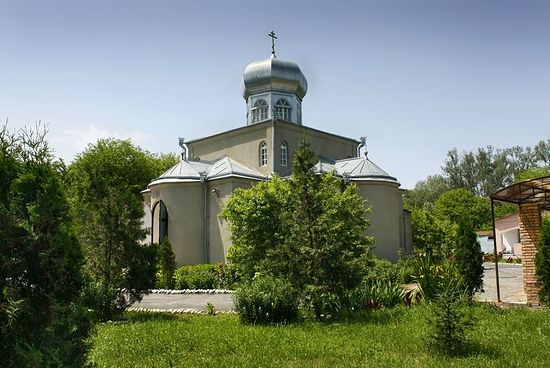 The Church of Nativity in Blagoveshenka Village. Located in the eastern part of Blagoveshenka settlement, 20 km west of Prokhladnyi and 46 km northeast of Nalchik.
The Church of Nativity in Blagoveshenka Village. Located in the eastern part of Blagoveshenka settlement, 20 km west of Prokhladnyi and 46 km northeast of Nalchik.
Father George: Are the stories of other Orthodox Kabardians similar to yours?
Mikhail: I started looking for Orthodox Kabardians not so long ago. Surprisingly, I have already found quite a few of them. I found two Kabardians who are Orthodox priests. Both are priests in churches. They live in Krasnodarsky Krai. The paths of the others are different. For example, one girl, an Orthodox Kabardian from Nalchik, was sympathetic to Orthodoxy from her childhood. Her ancestors were probably Greek priests and she was raised in accordance with Orthodoxy, even though their family is Muslim. Others too got to make this choice in their childhood. There are also those who converted to Christianity when they were adults. So, it is different for everybody. The most interesting thing for me is that there are many Orthodox Kabardians. I don’t even have to say that most of the Kabardians living in Mozdok are Orthodox. It is absolutely normal there. If you were born a Kabardian, you can be either Muslim or Orthodox. The same goes for Ossetians, some of them are Orthodox and some are Muslims.
Our people simply forgot that a person can become Christian. People are vigorously opposed to it. But in fact it is absolutely normal. We have to make a choice in our lives. We can’t live as we are forced to live. We have to choose the path that is dear to our hearts and not be afraid of anything. When you convert to Orthodoxy, your life is divided into “before” and “after”. In this life we have to choose—are we with God or not? Do we want to receive the Heavenly Kingdom or not? As God told John the Theologian in Revelation, But the fearful, and unbelieving… shall have their part in the lake which burneth with fire and brimstone (Rev. 21:8). If we are always afraid or ashamed of something, there won’t be a place near God for us. I know such people. When you talk to Kabardians or Adyghes in private, many of them are sympathetic to Orthodoxy, but at the same time they are afraid. Some may be afraid of reprisals, although I don’t think that is very likely. Some are embarrassed to tell their relatives about it. But that is life, you will eventually have to make the choice. That’s for sure.
Father George: Yes. We only have one life and the choice we make determines our eternal fate. Thank you for the interview. I hope God will help you on your path!









